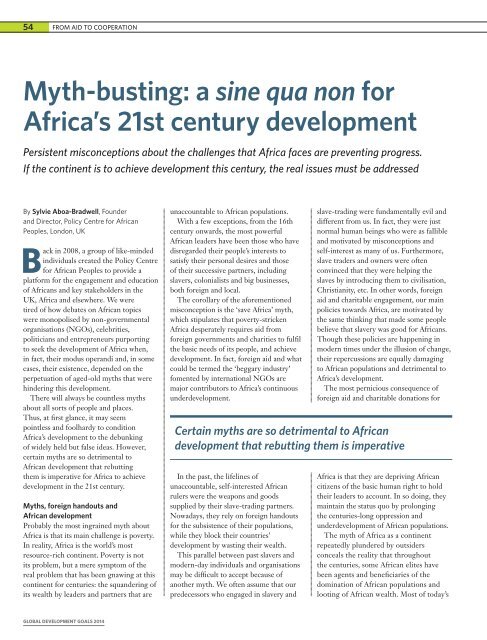FAMBB
FAMBB
FAMBB
You also want an ePaper? Increase the reach of your titles
YUMPU automatically turns print PDFs into web optimized ePapers that Google loves.
54 FROM AID TO COOPERATIONMyth-busting: a sine qua non forAfrica’s 21st century developmentPersistent misconceptions about the challenges that Africa faces are preventing progress.If the continent is to achieve development this century, the real issues must be addressedBy Sylvie Aboa-Bradwell, Founderand Director, Policy Centre for AfricanPeoples, London, UKBack in 2008, a group of like-mindedindividuals created the Policy Centrefor African Peoples to provide aplatform for the engagement and educationof Africans and key stakeholders in theUK, Africa and elsewhere. We weretired of how debates on African topicswere monopolised by non-governmentalorganisations (NGOs), celebrities,politicians and entrepreneurs purportingto seek the development of Africa when,in fact, their modus operandi and, in somecases, their existence, depended on theperpetuation of aged-old myths that werehindering this development.There will always be countless mythsabout all sorts of people and places.Thus, at first glance, it may seempointless and foolhardy to conditionAfrica’s development to the debunkingof widely held but false ideas. However,certain myths are so detrimental toAfrican development that rebuttingthem is imperative for Africa to achievedevelopment in the 21st century.Myths, foreign handouts andAfrican developmentProbably the most ingrained myth aboutAfrica is that its main challenge is poverty.In reality, Africa is the world’s mostresource-rich continent. Poverty is notits problem, but a mere symptom of thereal problem that has been gnawing at thiscontinent for centuries: the squandering ofits wealth by leaders and partners that areunaccountable to African populations.With a few exceptions, from the 16thcentury onwards, the most powerfulAfrican leaders have been those who havedisregarded their people’s interests tosatisfy their personal desires and thoseof their successive partners, includingslavers, colonialists and big businesses,both foreign and local.The corollary of the aforementionedmisconception is the ‘save Africa’ myth,which stipulates that poverty-strickenAfrica desperately requires aid fromforeign governments and charities to fulfilthe basic needs of its people, and achievedevelopment. In fact, foreign aid and whatcould be termed the ‘beggary industry’fomented by international NGOs aremajor contributors to Africa’s continuousunderdevelopment.slave-trading were fundamentally evil anddifferent from us. In fact, they were justnormal human beings who were as fallibleand motivated by misconceptions andself-interest as many of us. Furthermore,slave traders and owners were oftenconvinced that they were helping theslaves by introducing them to civilisation,Christianity, etc. In other words, foreignaid and charitable engagement, our mainpolicies towards Africa, are motivated bythe same thinking that made some peoplebelieve that slavery was good for Africans.Though these policies are happening inmodern times under the illusion of change,their repercussions are equally damagingto African populations and detrimental toAfrica’s development.The most pernicious consequence offoreign aid and charitable donations forCertain myths are so detrimental to Africandevelopment that rebutting them is imperativeIn the past, the lifelines ofunaccountable, self-interested Africanrulers were the weapons and goodssupplied by their slave-trading partners.Nowadays, they rely on foreign handoutsfor the subsistence of their populations,while they block their countries’development by wasting their wealth.This parallel between past slavers andmodern-day individuals and organisationsmay be difficult to accept because ofanother myth. We often assume that ourpredecessors who engaged in slavery andAfrica is that they are depriving Africancitizens of the basic human right to holdtheir leaders to account. In so doing, theymaintain the status quo by prolongingthe centuries-long oppression andunderdevelopment of African populations.The myth of Africa as a continentrepeatedly plundered by outsidersconceals the reality that throughoutthe centuries, some African elites havebeen agents and beneficiaries of thedomination of African populations andlooting of African wealth. Most of today’sGLOBAL DEVELOPMENT GOALS 2014


